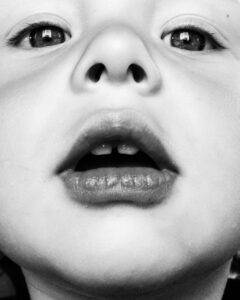The arrival of a newborn is always a time filled with excitement and a few surprises. One of those surprises might be a newborn baby with teeth. This rare condition can leave new parents with many questions and concerns.
This comprehensive guide will discuss what it means if your newborn baby with teeth, the potential implications, and how to care for your little one’s unique smile.
What Are Natal Teeth?
Natal teeth are teeth that are present at birth. These are different from neonatal teeth, which emerge within the first 30 days of a baby’s life. These teeth are relatively rare, occurring in about 1 in every 2,000 to 3,000 births. Natal teeth typically appear in the lower gum where the central incisors (the two front teeth) are located.
While they can be alarming, understanding the nature of natal teeth can help parents manage this condition effectively.
Causes of Natal Teeth
The exact cause of natal teeth is not well understood, but several factors may contribute to their development:
- Genetics: If a parent or sibling had natal teeth, there’s a higher chance that the newborn might have them too.
- Developmental anomalies: Conditions such as cleft lip and palate, Ellis-van Creveld syndrome, and Sotos syndrome are associated with natal teeth.
- Maternal health: Certain maternal health issues during pregnancy can potentially influence the development of natal teeth. This includes nutritional deficiencies or exposure to certain medications or illnesses.
Appearance and Characteristics
Natal teeth often appear smaller and less well-formed than regular baby teeth. They may have a small root, making them appear loose or wobbly. In some cases, they might be extra sharp, which causes discomfort to the baby and mother during breastfeeding.
These teeth range from barely noticeable to clearly protruding from the gums, and their appearance varies widely.
Potential Problems with Natal Teeth
Feeding Challenges

One of the primary concerns with a newborn baby with teeth is the impact on breastfeeding. Natal teeth cause pain and discomfort for the mother due to the baby’s bite. Additionally, these teeth make it harder for the baby to latch onto the breast properly, potentially leading to feeding difficulties.
Ensure the baby is fed adequately, so promptly addressing these challenges is essential.
Risk of Choking
Loose natal teeth pose a choking hazard if they dislodge and are swallowed by the baby. This risk necessitates close monitoring and, in some cases, intervention by a pediatric dentist. Parents should be vigilant and consult a healthcare professional if they notice any looseness in the teeth or if the baby seems to be at risk of choking.
Oral Health Concerns
Natal teeth cause irritation or injury to the baby’s tongue or the delicate skin inside the mouth. If the teeth are particularly sharp or jagged, they might need to be filed down or removed to prevent injury. Oral health is critical even at this early stage, and preventing potential damage to the baby’s mouth is a top priority.
Infections
A newborn’s mouth isn’t accustomed to dealing with teeth, which leads to sores or infections, particularly if the teeth are loose and cause friction against the gums and surrounding tissues. Maintaining good oral hygiene and monitoring for signs of infection, such as redness, swelling, or pus, is important.
How to Care for a Newborn Baby with Teeth
Consulting with a Pediatrician
If your newborn has teeth, the first step is to consult with your pediatrician. The doctor will assess whether the teeth are causing immediate problems and advise how to proceed. In many cases, a referral to a pediatric dentist is necessary. A professional assessment ensures potential issues are identified and managed early.
Dental Evaluation
A pediatric dentist evaluates the condition of the natal teeth. They will check for the stability of the teeth and potential issues that might arise. Depending on their assessment, the dentist may recommend:
- Monitoring: Regular monitoring is suggested if the teeth are stable and don’t cause any problems.
- Extraction: If the teeth are loose, pose a choking hazard, or cause significant feeding problems or oral injuries, the dentist may recommend extraction. This is typically a quick and simple procedure done under local anesthesia.
Oral Hygiene
Even though these are natal teeth, maintaining oral hygiene is crucial. Use a clean, damp cloth to gently wipe the teeth and gums after feedings to prevent any buildup of milk or bacteria. Avoid using toothpaste at this stage, as it’s harmful if swallowed. Good oral hygiene practices will ensure the baby’s mouth remains healthy.
Feeding Adjustments
If breastfeeding becomes challenging due to natal teeth, consider these tips:
- Breastfeeding Position: Experiment with different positions to find one that minimizes discomfort.
- Nipple Shields: These provide a barrier between the baby’s teeth and the mother’s breast, reducing pain during feeding.
- Bottle Feeding: If breastfeeding is too painful, bottle feeding is the alternative. Ensure the baby receives the necessary nutrients and bonding time during feedings.
Practical Tips for Managing Natal Teeth
- Regular Monitoring: Even if the natal teeth aren’t causing immediate problems, keep a close watch on them. Regular monitoring helps early detection of potential issues, such as increased looseness or signs of infection. Keeping a journal of any changes you observe is helpful when discussing your baby’s condition with healthcare providers.
- Maintaining Comfort: Ensuring your baby’s comfort is paramount. If the natal teeth are causing discomfort or irritation, consult your pediatrician for appropriate pain relief methods. Sometimes, a teething ring or a cool, damp cloth relieves the baby’s gums.
- Adapting Feeding Practices: If breastfeeding is uncomfortable due to natal teeth, try different breastfeeding positions to find one that minimizes pain. A lactation consultant provides additional strategies and support. If switching to bottle feeding, choose a comfortable nipple for the baby and mother.
When to Seek Immediate Help
While many cases of natal teeth don’t cause serious problems, there are certain situations where immediate medical attention is necessary:
- Choking Hazard: If a tooth becomes very loose or falls out, posing a choking risk.
- Severe Pain: If the baby seems to be in significant pain, refusing to feed, or showing signs of distress.
- Infections: Signs of infection such as swelling, redness, or pus around the teeth or gums.
- Feeding Difficulties: If the baby isn’t feeding well and not gaining weight appropriately.
Emotional Support for Parents
Understanding the Emotional Impact
Discovering that your newborn has natal teeth can be surprising and even overwhelming. Parents may experience emotions, from worry to confusion. Understanding that these feelings are normal is the first step in addressing them.
Seeking Support
Parents seek support, from healthcare professionals, family, or friends. Speaking with a pediatrician or pediatric dentist provides reassurance and practical advice. Additionally, joining parenting groups or forums where you share experiences and gain insights from other parents who have gone through similar situations can be very helpful.
The Role of Genetics in Natal Teeth
Family History and Natal Teeth
Genetics plays a significant role in the occurrence of natal teeth. If there’s a family history of natal teeth, the likelihood of a newborn having them increases. Discussing your family history with your pediatrician provides insights into potential genetic factors.
Genetic Counseling
Concerns about genetic factors, genetic counseling offers valuable information. A genetic counselor assesses the likelihood of natal teeth occurring in future pregnancies and provide guidance on managing associated health conditions.
Professional Opinions on Natal Teeth
Pediatricians’ Perspective
Pediatricians encounter natal teeth during routine newborn check-ups. Their primary concern is ensuring the teeth don’t pose any health risks. They work closely with pediatric dentists to provide comprehensive care and address issues.
Pediatric Dentists’ Expertise
Pediatric dentists specialize in the oral health of infants and children. Their expertise is crucial in managing natal teeth. They assess the stability and health of the teeth, recommend appropriate interventions, and guide parents on maintaining oral hygiene.
Long-Term Outlook
- Impact on Dental Development: Having natal teeth doesn’t impact the long-term development of a child’s teeth. The permanent teeth will still develop normally in most cases. Regular dental check-ups will ensure your child’s oral health remains on track. Ensuring proper dental care from the beginning helps prevent future issues.
- Monitoring Growth and Development: As your child grows, continue regular dental visits to monitor their oral health. This helps catch potential issues early and ensure proper dental care as more teeth come in. Pediatric dentists provide valuable guidance on maintaining oral health and addressing any concerns.
- Maintaining Oral Hygiene: As your child grows older, instill good oral hygiene habits from a young age. Brushing twice daily, regular dental check-ups, and a healthy diet all contribute to a lifetime of good oral health. Teaching your child the importance of oral care sets the foundation for a healthy smile.
FAQs About Natal Teeth
Are Natal Teeth Harmful?
Natal teeth are not necessarily harmful but require monitoring and sometimes intervention. Most natal teeth are benign, but potential issues like choking hazards or oral injuries are addressed promptly. Regular check-ups with a pediatric dentist help ensure any problems are managed effectively.
Are Natal Teeth Permanent?
No, natal teeth are not permanent. They’re part of the primary teeth that eventually fall out to make way for permanent teeth. However, the exact timeline varies. Some natal teeth are prone to falling out early, especially if not well-rooted.
Will My Baby Experience Pain?
While some babies may experience discomfort due to natal teeth, it’s not universal. Observing your baby’s behavior and consulting with healthcare professionals helps manage pain or discomfort. Interventions like filing down sharp edges or extracting loose teeth may be necessary.
Can Natal Teeth Be Prevented?
There is no known way to prevent natal teeth since their exact cause remains unclear. However, maintaining good prenatal care and following your doctor’s advice during pregnancy helps ensure overall fetal health. Genetics and other factors play a significant role in natal teeth.
How Will Natal Teeth Affect My Baby’s First Year?
For most babies, natal teeth don’t significantly impact their first year. They can feed, grow, and develop normally with appropriate care and monitoring. Any issues are typically manageable with the help of healthcare professionals. Maintaining a proactive approach to your baby’s health will help address any concerns early.
Can Natal Teeth Affect Speech Development?
In most cases, natal teeth don’t impact speech development. Regular dental check-ups ensure that potential issues are addressed early. If the teeth are causing significant oral health problems, your pediatric dentist will provide guidance on appropriate interventions.
Do Natal Teeth Require Special Dental Care?
Yes, natal teeth require special attention to maintain oral hygiene and prevent potential problems. Clean the teeth and gums with a damp cloth after feedings. As the baby grows, gentle brushing keeps the mouth clean and healthy.
Myths and Facts About Natal Teeth
Debunking Common Myths
Several myths about natal teeth, ranging from cultural beliefs to old wives’ tales. Some myths suggest that natal teeth bring good luck or indicate special abilities, while others believe they are an ill omen. It’s important to approach natal teeth with a medical perspective, focusing on the baby’s health and well-being.
Understanding the facts helps dispel any unnecessary fears or misconceptions.
Facts Based on Research

Research indicates that natal teeth are generally benign and can be managed. They’re not linked to serious health issues and don’t affect the baby’s long-term dental development. Understanding the facts helps dispel myths and alleviate parental concerns.
Effectively Manage Your Newborn Baby with Teeth
A newborn baby with teeth can be surprising and a little concerning for new parents, but it’s manageable with the right information and care. Consult with healthcare professionals, follow good oral hygiene practices, and closely monitor your baby’s development.
With these steps, you ensure your little one’s smile is healthy and bright from the very start. For more information on related topics, you can check out these articles on Omegapediatrics.com:
- 6 Reasons Why Some Mothers Find Bottle Feeding a Good Choice
- Infant Breastfeeding Made Better with These 9 Tips and Techniques
By staying informed and proactive, you can confidently navigate the early months of your baby’s life, even when faced with surprises like natal teeth.








